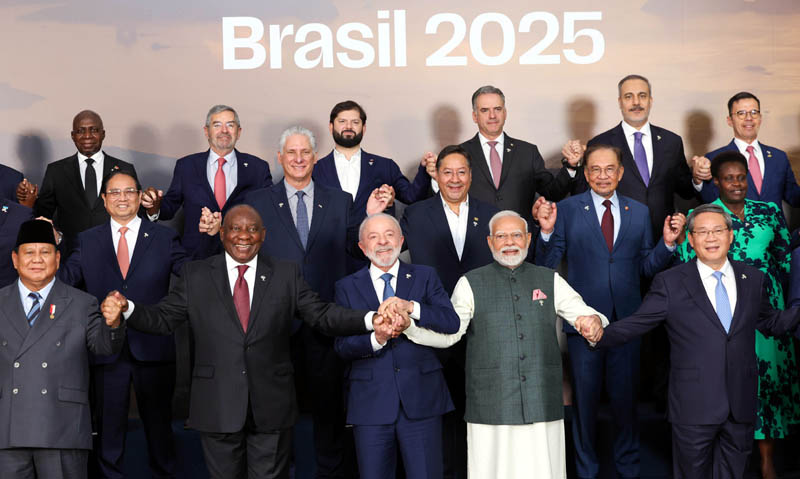The BRICS nations must work together to make supply chains for critical minerals and technology secure and ensure that no country uses these resources for its own “selfish gain” or as a “weapon” against others, Prime Minister Narendra Modi said at the annual summit of the grouping.
In his address at a session on multilateralism, financial matters and artificial intelligence on Sunday, Modi also called for creation of global standards for use of AI to maintain transparency and prevent misuse.
The Prime Minister’s comments on critical minerals came amid concerns over China restrictions on the export of the vital resources as well as its non-transparent policy approach in the sector.
“We need to work together to make supply chains for critical minerals and technology secure and reliable. It’s important to ensure that no country uses these resources for its own selfish gain or as a weapon against others,” Modi said.
Critical minerals such as lithium, nickel and graphite are considered vital for high-end technology products including electric vehicles (EVs), drones, and battery storage. China has been a dominant player in the critical minerals supply chain globally.
On artificial intelligence, Modi said it can greatly improve everyday life but on the other hand, it also raised concerns about risks, ethics, and bias.
The Prime Minister announced that India will organise the “AI Impact Summit” next year.
“We believe that resolving concerns and encouraging innovation should be given equal importance in AI governance. We must work together for responsible AI,” Modi said.
“Global standards must be created that can verify the authenticity of digital content, so that we can identify the source of the content and maintain transparency and prevent misuse,” he said.
The top leaders of BRICS held deliberations on a range of pressing challenges facing the globe at the summit in this seaside Brazilian city.
Chinese President Xi Jinping and his Russian counterpart Vladimir Putin skipped the summit. Iranian President Masoud Pezeshkian and Egypt’s Abdel-Fattah el-Sissi also didn’t attend the gathering.
The BRICS has emerged as an influential grouping as it brings together 11 major emerging economies of the world, representing around 49.5 per cent of the global population, around 40 per cent of the global GDP and around 26 per cent of the global trade.
In his remarks, the prime minister also talked about efforts by BRICS to help the Global South.
“In the form of BRICS New Development Bank (NDB), we have offered a strong and credible alternative to support the development aspirations of countries in the Global South,” he said.
At the same time, he said the NDB must focus on demand-driven approaches, long-term financial sustainability, and healthy credit rating. Strengthening our internal systems will further enhance the credibility of our call for reformed multilateralism, he said.
Modi said the countries of the Global South have some special expectations and aspirations from BRICS and it should work together to fulfil them.
“For instance, the BRICS Agricultural Research Platform, established in India, is a valuable initiative to enhance collaboration in agricultural research.” “It can become a medium for sharing research and best practices in topics such as agri-biotech, precision farming, and climate change adaptation. We can also extend its benefits to countries in the Global South,” he said.
At the same time, he said the NDB must focus on demand-driven approaches, long-term financial sustainability, and healthy credit rating. Strengthening our internal systems will further enhance the credibility of our call for reformed multilateralism, he said.
Modi said the countries of the Global South have some special expectations and aspirations from BRICS and it should work together to fulfil them.
“For instance, the BRICS Agricultural Research Platform, established in India, is a valuable initiative to enhance collaboration in agricultural research.” “It can become a medium for sharing research and best practices in topics such as agri-biotech, precision farming, and climate change adaptation. We can also extend its benefits to countries in the Global South,” he said.
The Prime Minister also proposed creation of a BRICS Science and Research Repository, which could also serve as a valuable resource for the countries of the Global South.
“The Global South has many hopes from us. To fulfil them, we must follow the principle of ‘Lead by Example’,” he said.
“India is fully committed to working shoulder-to-shoulder with all our partners to achieve our common goals,” he added.
Meanwhile, the review of the ASEAN-India FTA figured during Prime Minister Narendra Modi’s talks with his Malaysian counterpart Anwar bin Ibrahim on the sidelines of the BRICS summit.
The two leaders reviewed progress in bilateral relations, including in areas of trade and investment, defence, education, healthcare, tourism and people-to-people contacts, the Ministry of External Affairs (MEA) said in a statement on Sunday after the meeting.
Modi congratulated Malaysia for its successful chairmanship of the Association of Southeast Asian Nations (ASEAN), a regional grouping of 10 states in Southeast Asia.
PM Modi welcomed Malaysia’s continued support for a strengthened ASEAN-India Comprehensive Strategic Partnership, including the early and successful completion of the review of the ASEAN-India FTA, the MEA said.
The FTA was signed in 2009 and implemented in January 2010.
In August 2023, both sides announced a complete review of the existing agreement in goods by 2025.
It is learnt that the proposed negotiations for the FTA are not moving forward due to certain differences between the two sides.
The review of the agreement is a long-standing demand of Indian industry and India is looking forward to an upgraded pact, which will address the current asymmetries in bilateral trade and will make trade more balanced and sustainable.
After the implementation of the agreement, India’s exports stood at only about USD 38-39 billion annually, while imports from the 10-nation ASEAN bloc have jumped to USD 86 billion, according to Indian officials.
India is asking for a review to eliminate barriers and misuse of the pact. (PTI)







